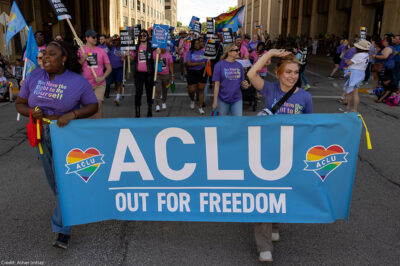(Originally posted on Daily Kos.)
On November 19, the California Supreme Court agreed to hear a lawsuit that we at the ACLU, the National Center for Lesbian Rights, Lambda Legal, and Equality California filed the day after the election, asking the Court to strike Proposition 8 down. Here’s what our case is about.
The California Constitution can be altered in two ways. The way most people know about is to simply amend the Constitution. Amendments are meant for less serious constitutional changes and are voted into effect by a simple majority of the voters. Proposition 8 was done as if it were an amendment. The other way to change the California Constitution is through what’s known as a revision, which is what the law requires for major, fundamental changes. Revisions have to be approved by 2/3 of each house of the legislature before the question is put to the voters.
In our case, we’re arguing that Proposition 8 is invalid because it calls for such an immense change in the California Constitution that it must be handled as a revision, rather than through an amendment.
Why is Proposition 8 a major change? Because it jettisons two of the central ideas on which the California Constitution — like the federal constitution — is based. First, the very idea of constitutional government and of the rule of law itself is that everyone is equal before the law, that there is one set of rules for everyone. Equality isn’t just a nice goal in the California Constitution’s Declaration of Rights; it’s a principle that resonates throughout the entire document. The second idea is that the very purpose of a Declaration of Rights (or a Bill of Rights in the federal constitution) is that it lays out rights which can’t be taken away just because a majority of people would like to do that. The guarantee of free exercise of religion means, for example, that unpopular religious groups can’t have their right to worship taken away.
Proposition 8 takes something the California Supreme Court already found to be a fundamental right — the right to marry — away from a historically disadvantaged minority — gay people. To put it bluntly, Proposition 8 put a cherished right of a protected minority up to a popular vote. That, we say, is such a drastic change in what the Constitution allows, a rejection of the very idea of protected rights and equal justice, that it must be treated as a revision of the Constitution, requiring the approval of the legislature before a vote. (You can read more about the case here).
Marriage isn’t the only thing at stake here. If the California Constitution can be amended to take the right to marry away from gay people, then any fundamental right could be snatched away from any group that’s outnumbered at the polling places. As one of the signs seen at the massive protests that have taken place around the country in the wake of Proposition 8 says, “You may not be gay – but you might be next.” That’s what we’ll be telling the California Supreme Court when arguments are held next March in our case, Strauss et al v. Horton et al. It’s difficult for me to think of a greater threat to the principles of individual freedom for which the ACLU stands.
— Matt Coles & Chris Hampton
To learn more about Prop. 8 and tools for advancing LGBT equality in your community, visit Get Busy, Get Equal!


